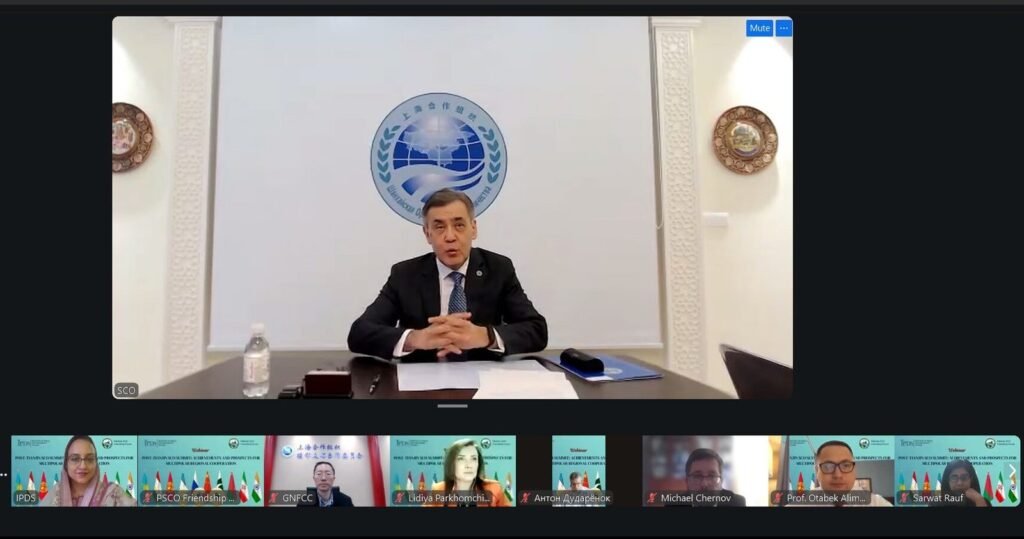Islamabad (TDI): The Centre for SCO Studies at Institute of Peace and Diplomatic Studies, along with Pakistan SCO Friendship Forum, organized a webinar on Wednesday, in which the Secretary General of the Shanghai Cooperation Organization (SCO), Mr. Nurlan Yermekbayev, participated as a Chief Guest.
Dr. Farhat Asif, President of the Institute of Peace and Diplomatic Studies, moderated the session, featuring seven esteemed speakers from China, Russia, Kazakhstan, Uzbekistan, Tajikistan, Belarus, and Pakistan.
During the introductory remarks, Dr. Farhat welcomed the participation of the guests in the webinar. She highlighted the efforts of the Institute of Peace and Diplomacy Studies in bridging the gap in research, training, and advocacy to promote informed foreign policy decision-making and foster sustainable peace at the national, regional, and global levels. She also informed the guests that the IPDS has launched a certificate and diploma course on SCO, as well as highlighted that the Centre for SCO Studies at the Institute of Peace and Diplomatic Studies was established as a dedicated platform to enhance Pakistan’s engagement and contribution within the SCO framework.
Mr. Nurlan Yermekbayev – SCO Secretary General
The first speaker of the webinar was Mr. Nurlan Yermekbayev, the Secretary General of the Shanghai Cooperation Organization (SCO). Mr. Nurlan Yermekbayev, expressed his gratitude to IPDS for conducting this webinar on the achievements of the Tianjin SCO Summit. During the speech, he highlighted the contribution Pakistan is making to enhance cooperation in the SCO. He also underscored the achievements of the Shanghai Cooperation Organization to ensure peace, stability, development, and prosperity in the region. The SCO member states approved the “SCO Development Strategy for the Next Decade (2026–2035)”, which identified the directions for deepening all-round cooperation, as well as the Program of Cooperation among the SCO Member States in Combating Extremist Ideology for 2026–2030 to implement the SCO Convention on Countering Extremism adopted in Astana on June 9th, 2017.
Mr. Yermekbayev also emphasized the significance of establishing the SCO Development Bank to accelerate consultations on a variety of issues related to the operation of this financial institution. Moreover, he underscored the importance of strengthening cooperation in energy security and protection of energy infrastructure, promoting investment cooperation and a fair energy transition in the context of instability in the international energy market, and to achieve regional energy sustainable development.
Talking about AI, Mr Yermekbayev welcomed the adoption of the resolution by the United Nations on July 25, 2025, on “The Role of Artificial Intelligence in Creating New Opportunities for Sustainable Development in Central Asia” and appreciated the designation of Cholpon-Ata, Kyrgyz Republic, as the SCO Tourism and Culture Capital for 2025–2026.
Mr Yermekbayev noted that the SCO understands its shortcomings and is continuously trying to improve and adapt to the constantly changing world. While concluding his speech, he stated that in 24 years, the SCO has managed to foster the world’s largest system of transregional cooperation. He is confident that, based on such sound foundations, the SCO will make more contributions to peace, equality, and stability in the vast region and beyond.
Yu Xueyong – Deputy Secretary General GNFCC
The second guest speaker of the event, Mr. Yu Xueyong, is the Deputy Secretary General of the Good-Neighborliness, Friendship and Cooperation Commission (GNFCC) of the SCO. He thanked IPDS for organizing the event and the Secretary General of SCO for his kind and encouraging remarks.
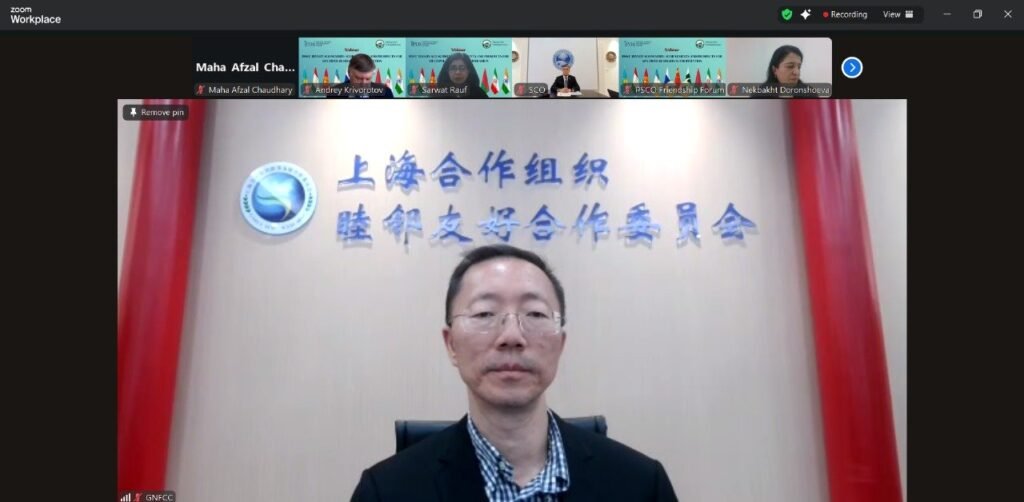
He highlighted the Global Governance Initiative (GGI) proposed by the President of the People’s Republic of China, Xi Jinping, at the Tianjin Summit in response to the challenges faced by the world today, and said that the GGI is based on the principles of upholding equality while abiding by international law and practicing multilateralism. The initiative has received a lot of support not only from the SCO member states but also from the entire international community.
Since taking the Presidency of the SCO in July 2024, China has been actively engaging with other member states and has organized more than 200 events, issued 92 outcome documents, and proposed 36 important cooperation initiatives. China has upheld its promise of hosting a friendly, united, pragmatic, and fruitful Summit, which has promoted the SCO into a new stage of high-quality development, featuring more unity and collaboration, dynamism, and accomplishments.
He also noted that the Tianjin Summit will be known as a milestone in the history of SCO’s development, and said that the SCO has been taking the lead in the worldwide regional cooperation endeavour. Since its formation, the SCO has been following the “Shanghai Spirit” of mutual trust, mutual benefit, equality, consultation, and respect for diverse civilizations. The SCO has successfully grown into a family of 27 countries, across the three continents of Asia, Europe, and Africa, combining nearly half of the total world population, and contributing to the world’s total economic output by a quarter. The success of SCO has set an example of regional cooperation and multilateralism.
Moreover, Mr. Yu Xueyong, stated that the Good-Neighborliness, Friendship and Cooperation Commission (GNFCC) is looking forward to working with the people-to-people friendship institutions of other SCO member states, to further the good momentum of the Tianjin Summit, and hold cultural activities, initiate beneficial and practical projects, facilitate people-to-people cooperation in the fields of education, poverty alleviation, healthcare, scientific, and technological development and innovation. He concluded by emphasizing the need to further contribute to global development, global security, global civilization, and the global governance initiative.
Dr. Andrey K. Krivorotov – Russian Academy of Sciences
The third guest speaker of the webinar was Dr. Andrey K. Krivorotov, a leading research fellow from the Institute of China and Contemporary Asia of the Russian Academy of Sciences. He appreciated the contributions of the Tianjin SCO Summit and the government of the People’s Republic of China in creating a system that is fair and would lead to a stable international order. He stated that there have been numerous conflicts and confrontations arising in the world, due to which there was a need for a humanistic and fair alternative, which is now being created by the global south, especially by the states of Africa, Asia, and Latin America. This reflects the maturity and the desire of these states to create a balanced international order.
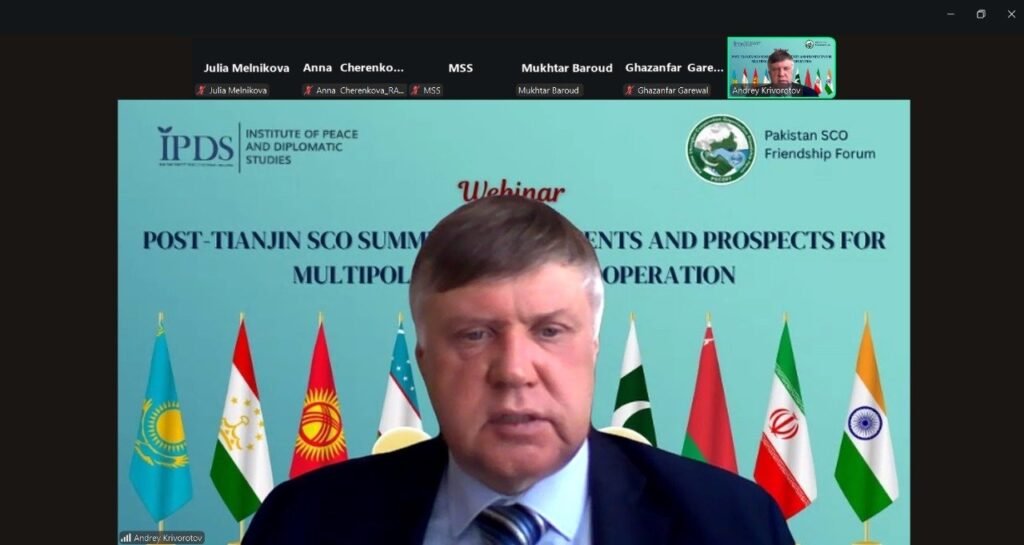
Dr. Andrey K. Krivorotov also noted that the Tianjin Summit reaffirmed shared support for multipolarity and closer coordination between Moscow and Beijing on global governance issues. He highlighted that President Putin, in his speech, supported President Xi Jinping’s initiative of global governance, stating that Russia is willing to engage with the SCO member states on the implementation of this initiative. The principles of inclusivity, fair treatment, and equality, underlined by President Xi’s leadership under this initiative, are fully in line with Russia’s policies. Both Russia and China have actively been engaging through high-level diplomatic engagements, and the leaders of the two states have been holding meetings with one another to achieve this goal.
Dr. Anton Dudaranak – BISS
The fourth guest speaker, Dr. Anton Sergeevich Dudaranak, Head of Division of the International Policy Department, Belarusian Institute of Strategic Research, stated that the SCO and BRICS frameworks are becoming the engines of South-South cooperation and regional resilience. He further noted that the geopolitical factors are increasingly changing and forming a new reality. Economic models, industrial production, and the structure of wealth as a whole are also rapidly changing. In parallel, new models of state interactions are also being enforced. He highlighted the economists’ prediction that by 2050, more than half of the projected population growth would be concentrated in the five African countries and the three countries of South and Southeast Asia, especially India, Pakistan, and the Philippines.
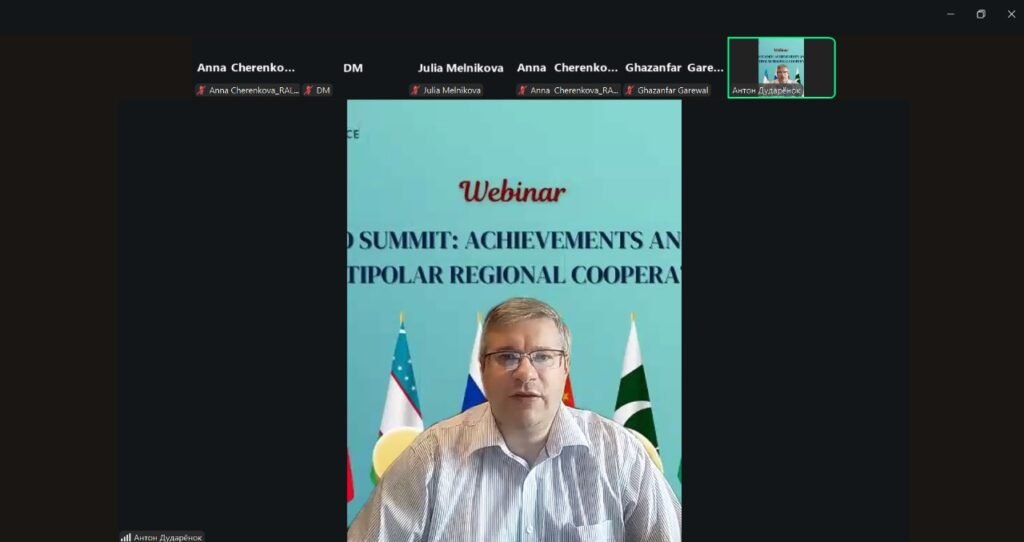
Referring to the achievement of the SCO, Dr. Anton Sergeevich Dudaranak acknowledged that the strengthening of the SCO is evidenced by the recent Tianjin Summit, which engaged the countries in a diverse discussion on the issues they are collectively facing. He also highlighted that the SCO and BRICS are not against the West but are parallel to it, promoting global cooperation based on the principles of justice and equality.
He noted that the declarations passed in the Tianjin Summit reflect the renewal of the organization towards a broader and more structured format. The proposal to create the financial and technological centres underscores the focus of the SCO towards engaging in expert interaction. The economic advancement of the SCO has also become more pronounced, and the 10-year SCO strategy indicates deepening practical cooperation in the fields of trade, economics, finance, and investments. The world has witnessed a shift in the global economic and political activity to the global south, and these states desire to achieve stable and uninterrupted supply chains. Belarus is also ready to contribute to this new type of interaction in the Eurasian space and promote a safe and stable world order. He noted that the people of Belarus fully support the policies of their government to cooperate with international organizations such as the SCO and BRICS.
Dr. Lidiya Parkhomchik – IWEP
Dr. Lidiya Parkhomchik, Chief Researcher of the Institute of World Economics and Politics (IWEP) of Kazakhstan, in her speech highlighted the growing importance of environmental and transport connectivity under China’s Belt and Road Initiative. She noted that Kazakhstan, which successfully concluded its Chairmanship of the Shanghai Cooperation Organization last year, views the SCO not merely as a platform for dialogue, but as a vital instrument for strengthening cooperation among member states, promoting joint development, and building a sustainable Eurasian architecture.
She also stressed that the recent Summit held in Tianjin marked a natural continuation of the previous collective efforts and has set the SCO on a forward-looking trajectory, providing member states with a valuable opportunity to align their strategies and advance institutional reforms within the Organization.
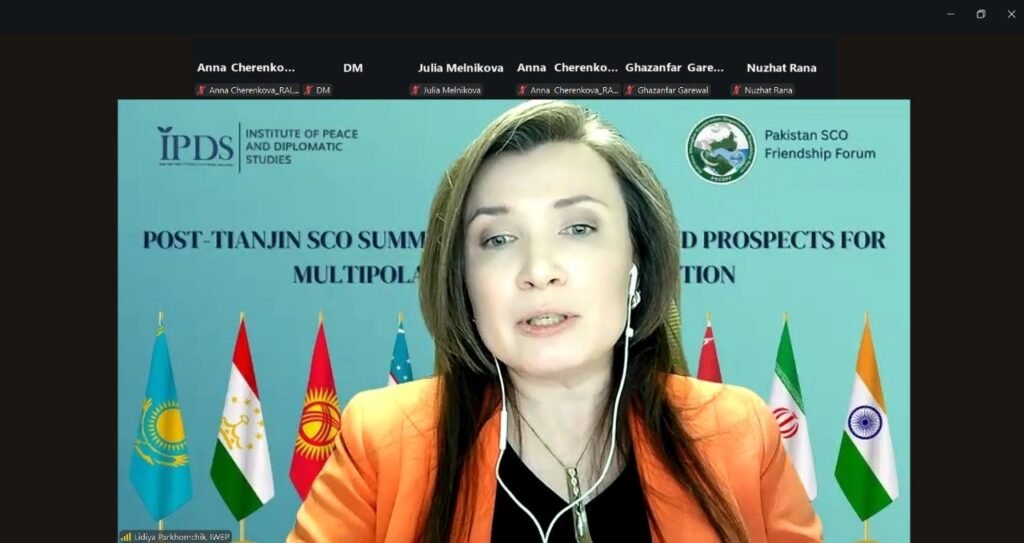
Furthermore, this Summit holds particular significance for the member states for several reasons. It represented the largest gathering in the entire history of the SCO. It also underscored the SCO’s evolution into the world’s largest regional body, with a combined economic output nearing $30 trillion. The official statistics of Kazakhstan indicate that the region has witnessed a remarkable economic growth, expected to accelerate further in the coming years.
Dr. Lidiya Parkhomchik highlighted that security remained a central focus of the discussions during the Tianjin SCO Summit, which reflects the shared concerns of member states over the rise of terrorism and extremism worldwide. She also noted that these challenges can only be effectively addressed through collective and coordinated actions by the SCO member states.
Emphasizing the humanitarian assistance to countries such as Afghanistan, Dr Lidiya said that Kazakhstan, during the Summit, proposed to the SCO members to extend humanitarian assistance to Afghanistan. Kazakhstan has already initiated several infrastructure projects in partnership with the Afghan government, and has also contributed to launching the UN Regional Centre for the Sustainable Development Goals (SDGs) for Central Asia and Afghanistan, which aims at fostering cooperation between Central Asia and Afghanistan. She also urged the SCO member states to collaborate with this Centre to further enhance regional cooperation in key priority areas.
Moreover, Dr. Lidiya noted that Kazakhstan supports the establishment of the SCO Development Bank and envisioned it as a global financial institution to fund development projects and strengthen economic collaboration among member states. Kazakhstan also advocates for the promotion of interregional connectivity by integrating major initiatives such as the Belt and Road Initiative (BRI) and acknowledges the efforts of all parties to align the BRI with the construction of the Eurasian Economic Union. The development of the North–South and East–West transport corridors has opened new avenues for trade, connectivity, and shared prosperity across the region.
Discussing the need for collaboration regarding environmental protection, Dr. Lidiya highlighted that Kazakhstan, during the Summit, called for a joint action to address ecological challenges in and around the Caspian Sea. While concluding the speech, Dr. Lidiya stated that Kazakhstan remains committed to fostering regional stability, economic growth, and sustainable development under the framework of the Shanghai Cooperation Organization.
Dr. Sarwat Rauf – National University of Modern Languages
Dr. Sarwat Rauf, Head of the Department of International Affairs, NUML University from Pakistan, called for institutional strengthening and regulatory alignment within the SCO system. She highlighted the key achievements of the Tianjin SCO Summit, emphasizing that the “Shanghai Spirit” embodies the principles of peaceful coexistence, mutually beneficial cooperation, and the collective pursuit of a multipolar world. This spirit, she noted, also provides a strategic framework for SCO member states to address and resolve internal conflicts through dialogue and collaboration.
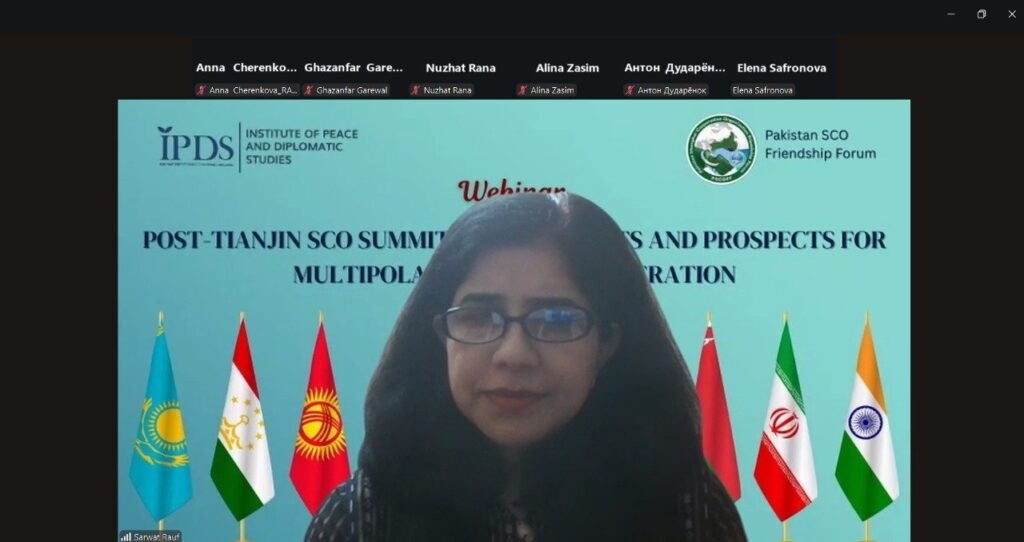
One of the major outcomes of the Tianjin Summit was the establishment of four specialized security centers: the Universal Centre for Countering Security Challenges and Threats, the Information Security Center, the Center for Combating Transnational Organized Crime, and the Anti-Drug Center. The creation of these institutions reflects the growing concern of SCO member states over evolving security threats and their shared commitment to tackling these challenges through coordinated efforts.
She also expressed optimism regarding the continued expansion of the SCO, as demonstrated by the participation of new states through partnership and observer status — a clear testament to the Organization’s rising global relevance and appeal. Recognizing the importance of financing development initiatives within the SCO framework, she reiterated the need for establishing the SCO Development Bank, which would serve as a common platform to unite partners and stakeholders in advancing shared growth and prosperity.
Dr. Doronshoeva Nekbakht
Dr. Doronshoeva Nekbakht, Head of the US and Canadian Department at the Institute for the Study of Problems of Asian and European Countries, National Academy of Sciences of Tajikistan, described the Shanghai Cooperation Organization as a “symbol of the multipolar transition,” highlighting the establishment of new regional centers for information and food security as clear evidence of deepening cooperation among member states.
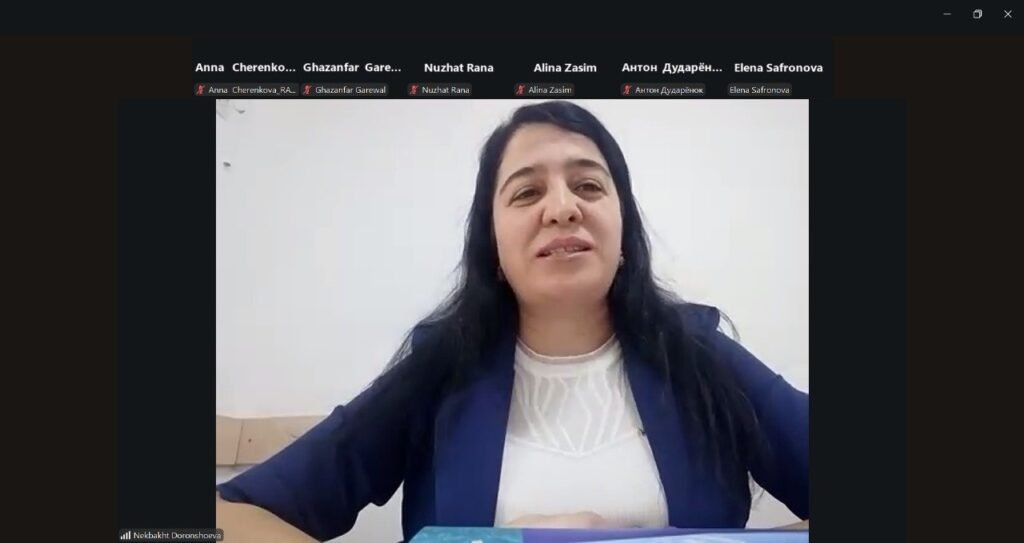
She emphasized that the SCO is making significant progress despite the growing geopolitical and security challenges and the changing world order. According to her, the Organization’s practical cooperation mechanisms are designed to promote peace, stability, development, and prosperity across the SCO region. She noted that the recently approved SCO Development Strategy for the Next Decade (2026–2035) outlines priority objectives and key directions for enhancing comprehensive cooperation among member states.
She outlined four key priorities in the SCO’s agenda for the next decade: strengthening regional and global security against traditional and emerging threats; advancing economic integration through trade, infrastructure, and connectivity initiatives; promoting humanitarian and cultural cooperation to enhance people-to-people ties; and fostering digital innovation to modernize economies and improve regional competitiveness. She also highlighted that through the development of four security centers, SCO would serve as operational platforms for intelligence sharing, policy coordination, and capacity-building initiatives, thereby strengthening collective resilience against evolving security risks.
Dr. Alimardonov Otabek – SCO Centre of Public Diplomacy
The last guest speaker of the session was Dr. Alimardonov Otabek Kudratovich from the SCO Centre of Public Diplomacy in Uzbekistan. He highlighted the significance of public diplomacy and people-to-people engagement at the SCO, especially in the growing multipolar world, which is key to advancing the SCO’s mission of shared development and understanding.
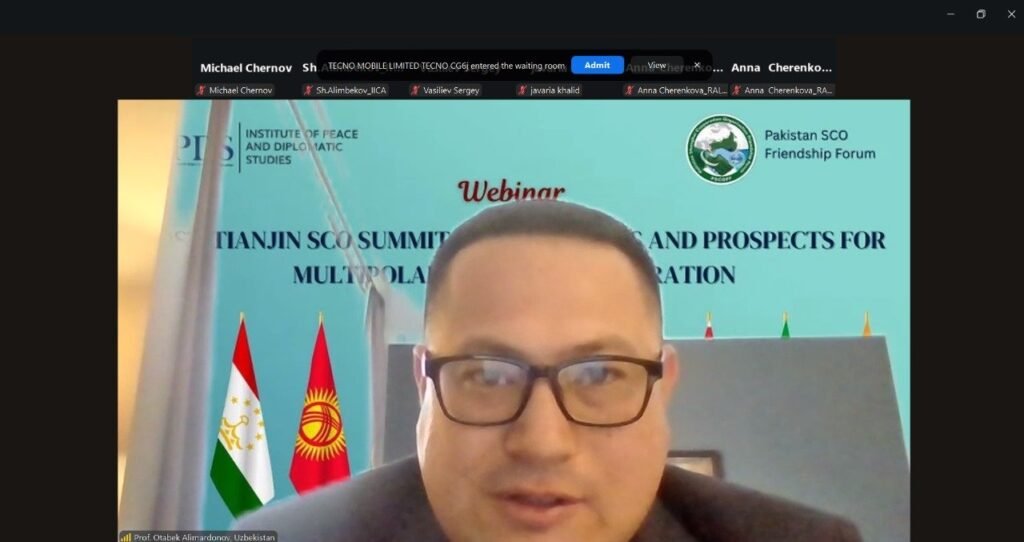
Dr. Alimardonov shared his reflections on the role of the SCO Centre for Public Diplomacy and the Institute of Peace and Diplomatic Studies (IPDS), noting their strong partnership in promoting dialogue and mutual understanding. He thanked all participants for their active engagement in the seminar.
During his speech, he highlighted the importance of sharing knowledge, advancing research, and strengthening people-to-people connections under the framework of the “Great SCO Family,” which plays a crucial role in shaping peace and stability around the world. He also emphasized the significance of public diplomacy, noting its role in the foundation for true regional cooperation. Referring to the initiatives of the Republic of Uzbekistan, Dr. Kudratovich stated that Uzbekistan has consistently been supporting the efforts to strengthen democracy, cooperation, and dialogue within the region. He expressed optimism about the outcomes of the current seminar, which would generate new ideas and contribute to building a more interconnected, cooperative, and multipolar world.
Concluding his remarks, Dr. Alimardonov once again thanked the organizers of the webinar and highlighted the significance of the SCO Auditorium at the National University of Uzbekistan, which serves as a dedicated space, showcasing the cultural heritage of all SCO member states, and encourages students to learn about diplomacy and international cooperation.
Concluding the webinar, Dr. Farhat Asif thanked the Chief Guest, Mr. Nurlan Yermekbayev, for his participation and insightful remarks, and other participants for their contribution. The webinar was attended by a large number of scholars and researchers, diplomats, and media representatives from across the region.
Javaria Khalid is a writer and researcher, who specializes in Pakistan's Foreign Policy Analysis, transatlantic geopolitics, and Pakistan’s relations with the European countries and the EU. She can be reached at javariakhalid011@outlook.com

